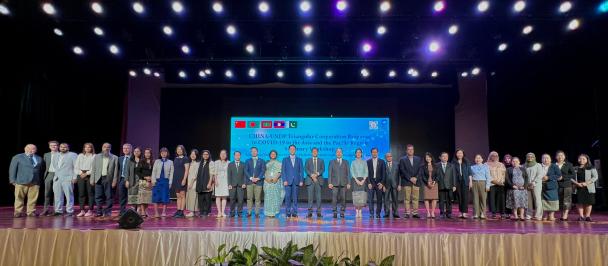Chișinău—COVID-19 has disrupted every aspect of life in Moldova, according to a new UN response and recovery plan, prepared with technical leadership from UNDP. The plan calls for expanded basic services, social protections, and access to digital citizen-driven social services for vulnerable people in the landlocked Eastern European country.
The UN plan comprises five pillars: preserving health, protecting people, facilitating economic recovery, advancing a macroeconomic response and multilateral collaboration, and boosting social cohesion and community resilience.
UNDP recently finalized the assessment of immediate, medium-term, and long-term impacts of the pandemic, with recommendations to the Government on ways to address them. Moldova’s economic output is expected to dive 6.7 percent this year before recovering to 0.2 percent growth in 2021, according to World Bank forecasts.
“What we see is that a return to the pre-COVID normalcy is neither possible nor desirable,” UNDP Resident Representative for the Republic of Moldova Dima Al-Khatib said.
“The linkages between health and the environment are clear, as is the need to bridge lessons learnt from this crisis to the climate crisis. Building forward better will require major investments in primary health care and education, expanded access to information and more inclusive social services, support for civil society, and broader engagement with the private sector—with a special focus on women, children, migrants, the elderly, the poor, and other vulnerable groups.”
Vulnerable communities stand to benefit most from more democratic, transparent, and accountable governance, including secure Internet voting systems accessible both to Moldovans inside the country and to an estimated 1 million Moldovans living abroad. UNDP is also working with partners toward digitization of public and administrative services, including citizen e-participation, e-data, e-learning, and a digital economy.
“These e-tools enhance the transparency and accountability of public institutions and provide better access to citizens to participate in decision-making, contribute to the development of people-centred services, and ensure government transparency and efficiency,” Al-Khatib said.
In terms of response, UNDP has delivered medical supplies to frontline workers and medical facilities on both banks of the Nistru river—including hospitals and primary healthcare centers. Employees of the National Employment Agency, local public authorities from more than 100 communities, civil society organizations, and local volunteers have also been engaged in campaigns to prevent and control the spread of COVID-19.
With UNDP support, small businesses from all regions of the country are receiving technical and financial assistance to build resilience to crises and generate jobs for vulnerable people.

 Locations
Locations



